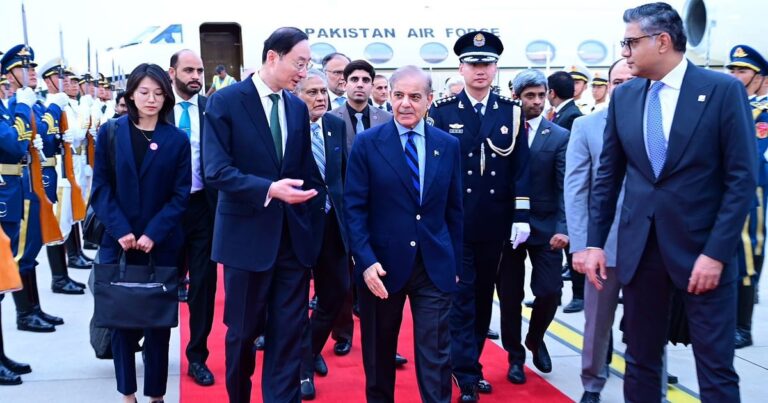BEIJING/SHENZHEN: Tasked with seeking Chinese investment to revive Pakistan’s cash-strapped economy, Prime Minister Sharif on Wednesday promised full protection from a spate of terror attacks targeting Chinese personnel.
Sharif arrived in the southern hi-tech city of Shenzhen on Tuesday on the first leg of a five-day official visit to China.
The 72-year-old leader is on his first visit to China since taking over as prime minister for a second term after the Pakistan Muslim League-Nawaz (PML-N)-led coalition took power in March.
Speaking at the Pakistan-China Business Forum, Sharif assured Chinese investors of full support and the safety of Chinese individuals, projects and investments in Pakistan, the state-run Associated Press Pakistan reported.
He said the Pakistan government has taken various steps to ensure complete security to safeguard the lives of Chinese workers.
“I guarantee and assure you that we will do everything in our power to protect the lives of Chinese workers and provide them with more safety than my own children. This will never happen again,” he said.
He described a terror attack in March in Besham, Pakistan, that killed five Chinese nationals and their Pakistani driver as “one of the saddest days of my life when the entire nation was in mourning.”
The most recent example was a suicide bomb attack in Dasu in March that killed five Chinese nationals and a Pakistani driver. Pakistan paid $2.58 million in compensation to the families of those killed in the attack.
He told the forum that Pakistan has mineral resources worth about $10 trillion but the country’s exports are only $30 billion.
He said the deposits have great potential to be extracted and converted into finished and semi-finished products for export, and called for investment in the mining industry.
Sharif compared the economic development of Shenzhen, which has a population of 13 million and a GDP of $500 billion, to that of Pakistan, which has a population of 250 million and a GDP of $380 billion.
Sharif arrived in Beijing on Wednesday and is due to meet Chinese President Xi Jinping and other government officials over the next two days to seek more investment and aid to improve Pakistan’s deteriorating economic situation.
Pakistan’s cash-strapped economy is facing severe headwinds and the country has formally requested the International Monetary Fund for its next bailout package of $6 billion to $8 billion, possibly boosted by climate change funding.
Ahead of his visit to China, Sharif said on Tuesday he was visiting Beijing with “serious plans” to deepen all-weather ties with China at a time when deadly terrorist attacks on Pakistan’s own citizens and a deepening political and economic crisis threaten China’s stability.
Sharif’s visit coincides with the conclusion of general elections in what India sees as a strategic rival and the formation of a new government in New Delhi.
Pakistan regards China as one of its most reliable friends in the world, Sharif told Chinese state media. Xinhua News Agency In an interview with the news agency, the two said that not only are they brothers of steel and have an unshakable friendship, but that “our hearts beat together.”
Ahead of the visit, China’s Foreign Ministry said Xi and Sharif would jointly draw up a blueprint during the trip, but gave no details.
China has reportedly spent around $28 billion on the estimated $62 billion China-Pakistan Economic Corridor (CEPC) since it was launched in 2013, but is increasingly cautious about investing further in the much-talked-about second phase in light of Pakistan’s worsening security, political and economic crisis.
CPEC, which links the port of Gwadar in Pakistan’s Balochistan province with China’s Xinjiang Uighur Autonomous Region, is a flagship project of China’s ambitious Belt and Road Initiative (BRI), which is seen as an attempt by China to expand its influence overseas through infrastructure projects funded by Chinese investment around the world.
India is staunchly opposed to the CPEC, which links China’s Xinjiang Uighur Autonomous Region with Pakistan’s port of Gwadar, as it passes through Pakistan-occupied Kashmir.
Published June 5, 2024 16:50 IST

